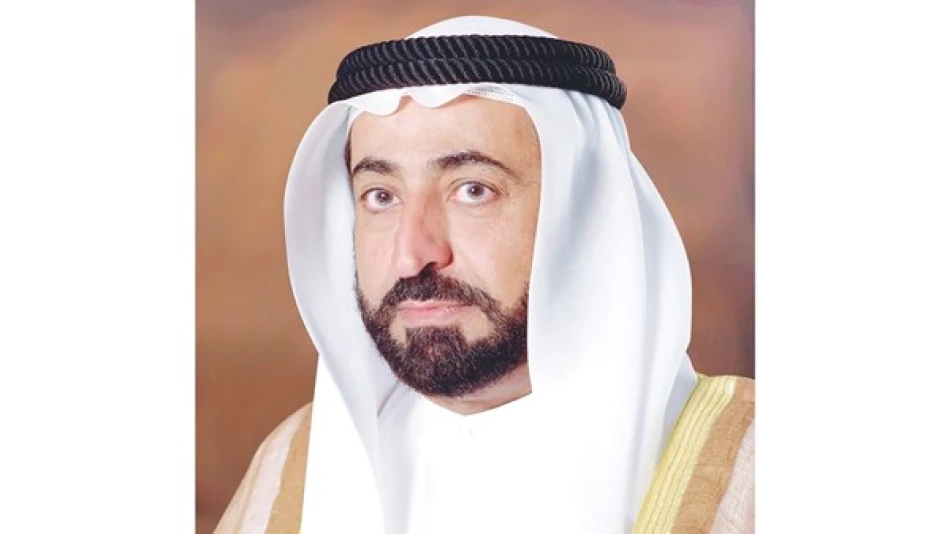
Sharjah Ruler Unveils 'Compendium of Chronicles': The Masterpiece Debuts at Sharjah International Book Fair
Sharjah Ruler Unveils Monumental 51-Volume Historical Archive as UAE Positions Itself as Regional Knowledge Hub
Sheikh Dr. Sultan bin Muhammad Al Qasimi, Ruler of Sharjah, has announced the upcoming release of what he calls "the greatest work" in historical documentation—a comprehensive 51-volume collection titled "Historical Compendium of the Arabian Peninsula and Persia." Set to debut at the 2025 Sharjah International Book Fair, this ambitious project represents the UAE's growing influence as a center for scholarly research and cultural preservation in the Middle East.
A Treasure Trove of Rare Documents
The monumental work spans centuries of regional history, incorporating previously inaccessible documents from Dutch, British, French, and Ottoman archives. Speaking during a live television interview, Sheikh Sultan emphasized the significance of the Ottoman documents, which he described as particularly rare and difficult to obtain.
"We managed to penetrate the document centers in Istanbul and successfully gather the material," he explained. The collection will serve as a primary source for researchers studying the Arabian Peninsula and Persia, filling critical gaps in regional historiography.
Strategic Academic Investment
The timing of this release reflects a broader regional trend where Gulf states are investing heavily in knowledge economies. Similar to how the UAE has positioned Dubai as a global business hub and Abu Dhabi as a cultural center through institutions like the Louvre Abu Dhabi, Sharjah is carving out its niche as the emirate of knowledge and research.
This approach mirrors Singapore's transformation from a trading post to a knowledge hub, or Ireland's evolution into a center for pharmaceutical and technology research. The UAE recognizes that oil-dependent economies must diversify, and cultural capital represents a sustainable competitive advantage.
The Arab Encyclopedia: An Even Grander Vision
Beyond the 51-volume historical compendium, Sheikh Sultan revealed plans for an even more ambitious project: The Arab Encyclopedia. This comprehensive work will chronicle Arab history from 550 BCE to the present, representing what he claims will be an unprecedented service to any nation.
"I don't think any nation in the world has received service in this manner," Sheikh Sultan stated, positioning the project as both a scholarly achievement and a matter of cultural pride.
Implications for Regional Scholarship
The encyclopedia project addresses a long-standing gap in Arabic historical documentation. Unlike European nations, which have extensive institutional archives dating back centuries, much of Arab historical documentation has been scattered across former colonial powers' archives or lost entirely.
By centralizing and systematically organizing these materials, Sharjah is creating what could become the definitive reference point for Middle Eastern studies globally. This positions the emirate to attract international scholars and research institutions, similar to how Oxford and Cambridge became centers of learning through their manuscript collections.
Economic and Cultural Strategy
This scholarly investment represents more than academic prestige—it's economic strategy. Knowledge-based tourism, academic conferences, and research partnerships generate significant revenue while building soft power influence. Qatar's investment in Education City and Saudi Arabia's NEOM project follow similar logic, but Sharjah's focus on historical documentation offers unique advantages.
Market Positioning
For investors and policymakers, Sharjah's approach demonstrates how smaller emirates can compete with larger neighbors through specialization. While Dubai dominates commerce and Abu Dhabi controls energy policy, Sharjah has identified cultural and educational excellence as its distinctive brand.
This strategy has proven successful in other contexts. Edinburgh leveraged its literary heritage to become a UNESCO City of Literature, generating millions in cultural tourism revenue. Sharjah's systematic approach to becoming the region's knowledge capital could yield similar returns.
Broader Regional Impact
The historical compendium and Arab Encyclopedia projects arrive at a crucial moment for Middle Eastern identity and scholarship. As the region grapples with rapid modernization and external cultural influences, these works provide anchor points for understanding historical continuity and cultural authenticity.
The inclusion of Ottoman documents is particularly significant, as Turkish-Arab relations have grown increasingly complex in recent years. By making these historical materials accessible, the project could facilitate better understanding of shared regional heritage beyond contemporary political divisions.
Academic Infrastructure Development
Sheikh Sultan's emphasis on training supervisory faculty reveals understanding that infrastructure extends beyond books to human capital. This echoes successful knowledge economy transitions in countries like South Korea, where government investment in education preceded economic transformation.
The Ruler's call for universities and graduate students to utilize these resources suggests Sharjah is positioning itself not just as a repository, but as an active center for ongoing research and scholarship. This could attract international academic partnerships and establish Sharjah as a required destination for Middle Eastern studies programs worldwide.
Most Viewed News

 Layla Al Mansoori
Layla Al Mansoori






